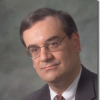Mark Krikorian

Mark Krikorian
Mark Krikorian has been the executive director of the Center for Immigration Studies, a think-tank in Washington, D.C since 1995. The Center describes itself as an "independent, non-partisan research organization" in Washington, D.C. that examines and critiques the impact of immigration on the United States. Animated by a "pro-immigrant, low-immigration vision which seeks fewer immigrants but a warmer welcome for those admitted," the Center was established in 1985 to provide immigration research. Krikorian is a regular contributor to the conservative...
issues interesting immigration
The interesting point is that the polarization is not so much among the public, although there's some of that. The polarization on the immigration issue is really between the elites and the public. In other words, this is not so much a right-left issue, which it is partly.
thinking focus drug
In enforcement, you always have to have both a focus on the really worst actors - you know, gang bangers, in this case, drug dealers, that sort of thing - but also routine enforcement because think about, for instance, the IRS. They don't say, OK, well, if you're not a money launderer, it doesn't matter whether you fill your tax return out right or not. They have both. They go after the really bad actors and they have a kind of general, routine enforcement
couple mean order
But the question is - are we deporting a couple hundred people for show or are we actually making a serious effort to remove everybody who's got a final order of removal? When I say enforcement theater, what I mean is a kind of pretend enforcement.
reality law people
Well, enforcement theater is OK if it's reality theater. In other words, obviously, you want to make it clear, you want to make people see that the law is being enforced.
government people trying
Well, nobody's being deported - nobody - practically. And so what the people down there getting is the American government is telling us that you're not going to be able to stay. But, in fact, they're letting almost everybody stay. And so what they're trying to do is show that at least some people are going to get deported.
summer running thinking
But the other audience, I think, is people in Central America because since last summer, they've been running ads down there - the United States government has - don't come, it's dangerous. You will be immediately deported. That's literally what it says in Spanish.
perception gaps immigration
There's definitely a huge gap between the elite and public perceptions on immigration.
country ease where-you-come
Assimilation is really a psychological process where you come to identify with a new country as yours. The ease of overseas travel and information access interferes with that.
home thinking talking
Well, because we're talking here about people who've been ordered deported and the administration has done nothing about actually making sure that they go home. This is theater, I think, for two audiences - one probably for the American public to some degree, to make it seem as though the administration is taking this renewed surge of Central Americans seriously.
different cards green
The effects of illegal immigration aren't that different from those of legal immigration —an illiterate Central American farmer with a green card is just as unsuited for a 21st-century economy as an illiterate Central American farmer without a green card.
jobs immigration done
Of 472 civilian occupations defined by the Department of Commerce, only six are majority immigrant (legal and illegal). These six occupations account for 1 percent of the total U.S. workforce. Many jobs often thought to be overwhelmingly done by immigrants are in fact majority native-born: 51 percent of maids are U.S.-born, as are 63 percent of butchers and meat processors, and 73 percent of janitors.
growth progress subsidies
By holding down natural wage growth in labor-intensive industries, immigration serves as a subsidy for low-wage, low-productivity ways of doing business, retarding technological progress and productivity growth.
benefits consumer cost creating immigrants loser specific spending taxpayers
Consumer spending by immigrants isn't creating specific benefits for Americans who are here. It's actually a big loser because the benefit from that spending isn't that great, and the cost it exacts from taxpayers is actually enormous.
call given interested offend passing side software talking
The administration hasn't given any detail. They're not interested in passing it. They're just interested in talking about it. In the software business, they call this vaporware. They don't want to offend this side or the other side, so they punt.